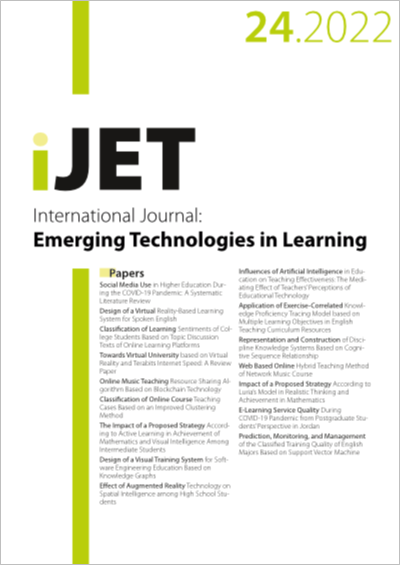Representation and Construction of Discipline Knowledge Systems Based on Cognitive Sequence Relationship
DOI:
https://doi.org/10.3991/ijet.v17i24.35947Keywords:
cognitive sequence relationship (CSR), discipline knowledge system, logic inference, back propagation neural network (BPNN)Abstract
For students, it’s an important but difficult thing to form a discipline knowledge system based on the sequence of cognition, and they would need teachers’ assistance for that. Therefore, how to arrange the scattered knowledge points in a sequence that conforms to the law of cognition, construct a complete discipline knowledge system, and help students attain, familiarize, absorb, and internalize the new knowledge in a scientific way are urgent issues to be solved for educationalists. To attempt to solve these questions, in a research background that the smart education has been applied and promoted widely, this paper took the finance discipline as an example to study the representation and construction of discipline knowledge system based on cognitive sequence. At first, this paper took a Back Propagation Neural Network (BPNN) based on complex rules as the Cognitive Sequence Relationship (CSR) construction algorithm for correcting contradictions in the CSR of knowledge points in the finance discipline knowledge system, gave the structure of the model for inferring the CSR of knowledge points in the finance discipline knowledge system, and adjusted the existing logical inference rules. Then, when building the CSR for the target discipline, this paper introduced a momentum factor σ into the network model to solve problems such as network oscillation and slow convergence. After that, the established finance discipline knowledge system was corrected to ensure that the old and new knowledge in the system could keep balance, and a fragment in the finance discipline knowledge dataset was introduced as an example. At last, the effectiveness of the proposed algorithm was verified by the experimental results.
Downloads
Published
How to Cite
Issue
Section
License
Copyright (c) 2022 Nan Zhang (Submitter); Xiaokun Xiong

This work is licensed under a Creative Commons Attribution 4.0 International License.



